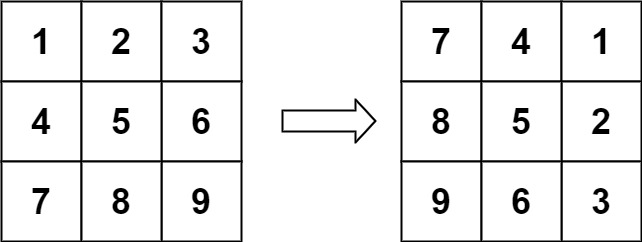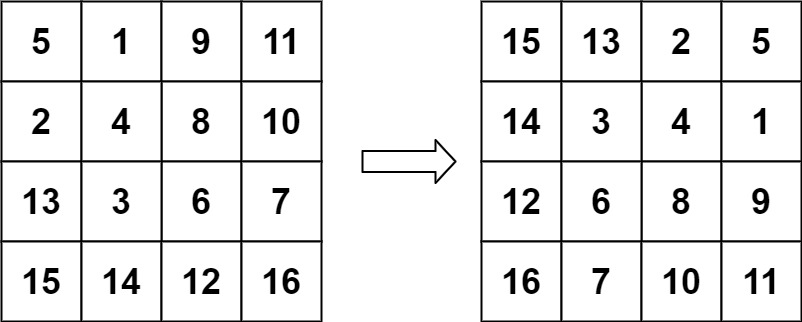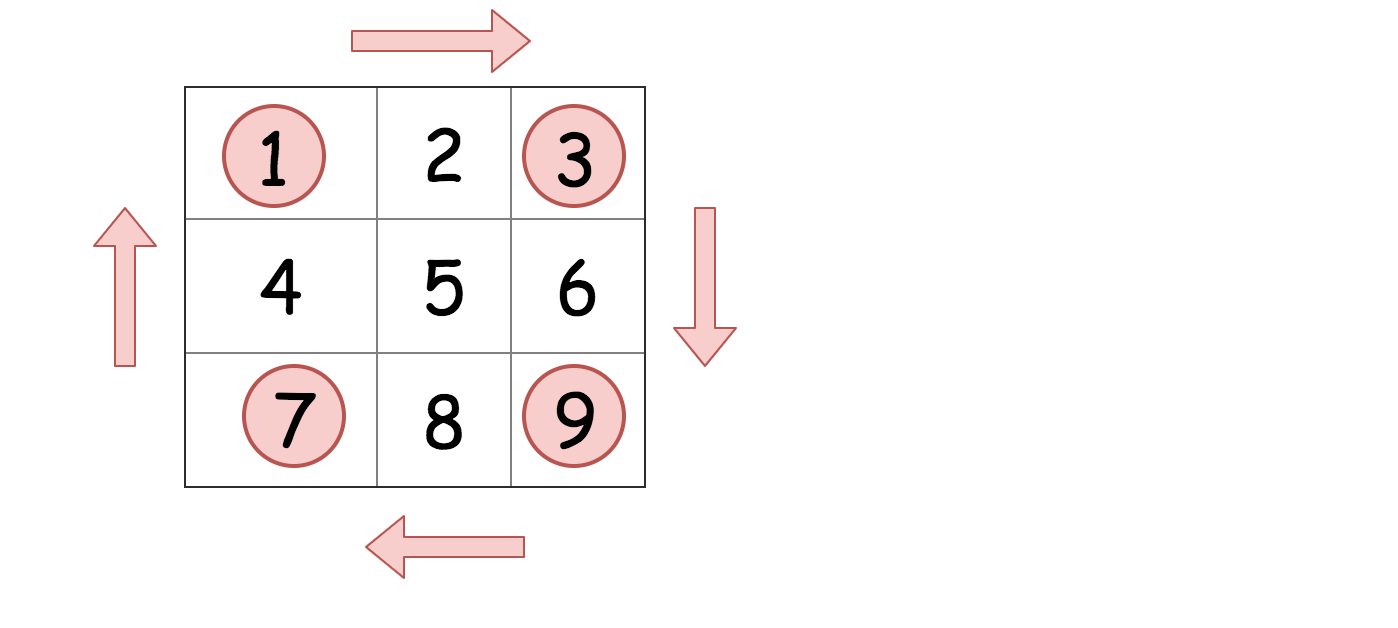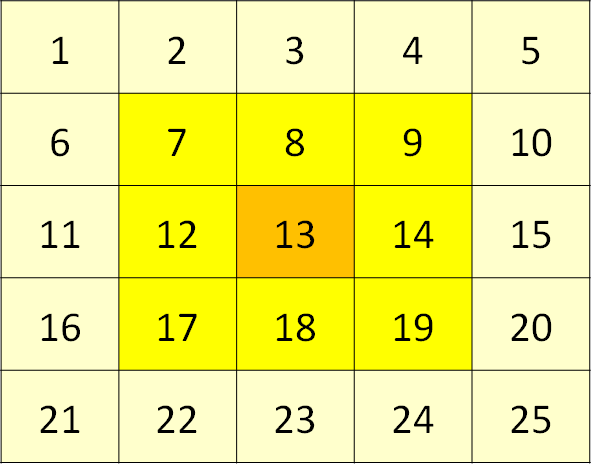Rotate Image - codepath/compsci_guides GitHub Wiki
Problem Highlights
- 🔗 Leetcode Link: Rotate Image
- 💡 Problem Difficulty: Medium
- ⏰ Time to complete: 25 mins
- 🛠️ Topics: Array, 2D-Array
- 🗒️ Similar Questions: Transpose Matrix, Flipping an Image
1: U-nderstand
Understand what the interviewer is asking for by using test cases and questions about the problem.
- Established a set (2-3) of test cases to verify their own solution later.
- Established a set (1-2) of edge cases to verify their solution handles complexities.
- Have fully understood the problem and have no clarifying questions.
- Have you verified any Time/Space Constraints for this problem?
- Can the input grid be blank??
- Let’s assume the grid is not blank. We don’t need to consider empty inputs.
- Can the row size be different from the column size?
- No, the row size is equal to the column.
- What are the time and space constraints?
- Time complexity should be
O(m*n), m being the rows of the matrix and n being the columns of matrix. Space complexity should beO(1).
- Time complexity should be
HAPPY CASE
Input: matrix = [1,2,3],[4,5,6],[7,8,9](/codepath/compsci_guides/wiki/1,2,3],[4,5,6],[7,8,9)
Output: [7,4,1],[8,5,2],[9,6,3](/codepath/compsci_guides/wiki/7,4,1],[8,5,2],[9,6,3)

Input: matrix = [5,1,9,11],[2,4,8,10],[13,3,6,7],[15,14,12,16](/codepath/compsci_guides/wiki/5,1,9,11],[2,4,8,10],[13,3,6,7],[15,14,12,16)
Output: [15,13,2,5],[14,3,4,1],[12,6,8,9],[16,7,10,11](/codepath/compsci_guides/wiki/15,13,2,5],[14,3,4,1],[12,6,8,9],[16,7,10,11)

EDGE CASE
Input: matrix = [1](/codepath/compsci_guides/wiki/1)
Output: [1](/codepath/compsci_guides/wiki/1)
2: M-atch
Match what this problem looks like to known categories of problems, e.g. Linked List or Dynamic Programming, and strategies or patterns in those categories.
For 2D-Array, common solution patterns include:
- Perform a BFS/DFS Search through the 2D Array
- A search through the 2D Array (either BFS or DFS) does not help us. We are rotating an image.
- Hash the 2D Array in some way to help with the Strings
- Hashing would not help us flipping a image horizontally, then inverting it
- Create/Utilize a Trie
- A Trie would not help us much in this problem since we are not trying to determine anything about a sequence of characters.
3: P-lan
Plan the solution with appropriate visualizations and pseudocode.
General Idea: Let's recursively rotate each item layer by layer.
1) Create a helper function with the boundary for rotation
a)Basecase: Single square
b)Rotate the items from upper-row with left-column, left-column with bottom-row, bottom-row with right-column, and right-column with upper-row
i) Store upper-row
ii) Set upper-row with value in left-column
iii) Set left-column with value in bottom-row
iv) Set bottom-row with value in right-column
v) Set the right-column with upper-row
c)Recursive reduce the layers
2) Run helper function starting at the outermost layer


⚠️ Common Mistakes
- Not every 2D-Array problem follows the common techniques.
4: I-mplement
Implement the code to solve the algorithm.
class Solution:
def rotate(self, matrix: List[List[int]]) -> None:
"
Do not return anything, modify matrix in-place instead.
"
def helper(top_left, bottom_right):
# Basecase: Single square
if bottom_right <= top_left:
return
# Rotate the items from upper-row with left-column, left-column with bottom-row, bottom-row with right-column, and right-column with upper-row
for i in range(top_left, bottom_right):
tmp = matrix[top_left][i] # Store upper-row
matrix[top_left][i] = matrix[n-i][top_left] # Set upper-row with value in left-column
matrix[n-i][top_left] = matrix[n-top_left][n-i] # Set left-column with value in bottom-row
matrix[n-top_left][n-i] = matrix[n-(n-i)][n-top_left] # Set bottom-row with value in right-column
matrix[n-(n-i)][n-top_left] = tmp # Set the right-column with upper-row
# Recursive reduce the layers
helper(top_left+1, bottom_right-1)
# Run helper function starting at the outermost layer
n = len(matrix)-1
helper(0, n)
class Solution {
public void rotate(int[][] matrix) {
// Run helper function starting at the outermost layer
int n = matrix.length;
solve(matrix, n, 0);
return;
}
void solve(int[][] matrix, int n, int start){
// Basecase: Center square
if(start >= n/2){
return;
}
// Rotate the items from upper-row with left-column, left-column with bottom-row, bottom-row with right-column, and right-column with upper-row
for(int i = start; i < n-1-start; i++){
int a = matrix[start][i];
int b = matrix[i][n-1-start];
int c = matrix[n-1-start][n-i-1];
int d = matrix[n-i-1][start];
matrix[start][i] = d;
matrix[i][n-1-start] = a;
matrix[n-1-start][n-i-1] = b;
matrix[n-i-1][start] = c;
}
// Recursive reduce the layers
solve(matrix, n, start+1);
}
}
5: R-eview
Review the code by running specific example(s) and recording values (watchlist) of your code's variables along the way.
- Trace through your code with an input to check for the expected output
- Catch possible edge cases and off-by-one errors
6: E-valuate
Evaluate the performance of your algorithm and state any strong/weak or future potential work.
Assume N represents the number of rows in 2D-array.
Assume M represents the number of columns in 2D-array.
- Time Complexity: O(N * M) we need to rotate each item in the 2D-Array
- Space Complexity: O(1), because we are not using any additional space, we rotate the image in-place.